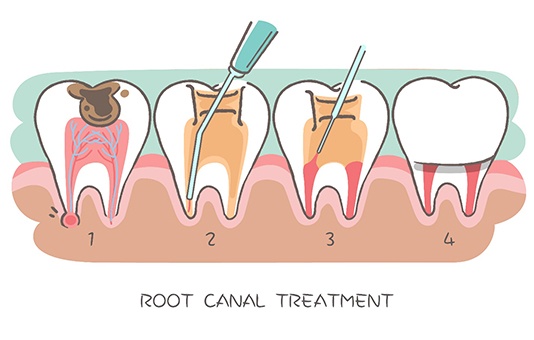Root Canal Therapy – Garland, TX
A Fast and Easy Toothache Treatment
Root canal therapy has a little bit of a bad reputation, but any dentist will tell you it’s one of the fastest and easiest toothache treatments available to patients. If you’re dealing with a severely infected tooth, this procedure may very well be the best way to help you.
Dr. Teresa Knott is an expert in restorative care and she’s here to help make the process as stress-free for you as possible. So if you’re in pain, don’t hesitate—call our office today!
Why Choose Town Center Dental For Root Canal Therapy?
- CEREC Same-Day Crowns Are Available
- Advanced Imaging Technology So You Can See Your Results
- Cutting-edge Dental Technology to Make Appointments Easy and Convenient
Do I Need Root Canal Therapy?

Root canal therapy is often done to address severe infections that have crept deep into the tooth. It’s particularly useful in situations where bacteria have begun to attack the root pulp. This kind of illness can lead to a throbbing toothache, swelling along the gum line, and even discoloration of the tooth itself.
You may also experience other symptoms of infection that may not seem related directly to the mouth. Along with the above symptoms, fever, chills, and fatigue are all indicators that your body is working hard to fight an infection. If you’re dealing with all of these problems, root canal therapy may be able to help you.
The Root Canal Process

The point of a root canal is to deal with infected root pulp, and it’s done by removing this pulp from inside the tooth. The first step is to numb the patient’s mouth completely—this is done to ensure that they won’t experience any discomfort at any point during the treatment. We will not begin the therapy until we’re sure that you won’t feel anything at all.
We’ll then use specialized instruments to open a hole in the affected tooth and remove the infected root pulp. Once the affected tissue is removed, a plastic substance called gutta percha is placed in the root canal, giving the tooth structure.
Finally, we’ll use our CEREC machine to mill you a dental crown that can be placed that very day. You’ll leave our office feeling good as new!
The Benefits of Getting a Root Canal

As you may have gathered from that description, any rumors about root canal therapy being painful are completely untrue. You’re unlikely to feel much of anything at all during the procedure, making root canal therapy a painless way to deal with an uncomfortable toothache.
Root canal therapy also has many benefits when you consider the alternatives. Typically, the only other thing that can be done for a tooth that has become infected to this extent is an extraction. Root canal therapy has the advantage of preserving the integrity of the natural tooth, meaning that you don’t have to go through the trouble of finding a method of tooth replacement that works for you.
Understanding the Cost of Root Canals

When you’re in urgent need of a root canal, the last thing you want is to have to think about the cost. That’s why we aim to be as transparent as possible about the cost of services and supply you with the information you need to make an informed decision.
We’ll obviously give you a complete estimate of the price of care once we meet you in person, but until then, here’s what you should know about the typical cost of root canals
Factors That Can Affect Root Canal Cost
The reason why it’s hard to give you an accurate assessment of the cost without meeting you in person is that the price of a root canal depends on a few factors.
For one, the type of tooth that is being treated can make a massive difference in the amount of work that needs to be done and therefore what the treatment will cost. This is because molars, for example, have three roots while the front teeth only have one or two.
In the case of more complex procedures, it may be necessary to direct you to a specialist to handle your root canal, which will also change the cost of the treatment. Finally, you may have to consider what the material of the dental crown used for your tooth will be made out of if you’re budgeting for the treatment.
Is it Cheaper to Pull My Tooth?
It’s normal for root canals to have a higher up-front cost than a tooth extraction, but that shouldn’t necessarily lead you to believe that removing a tooth is the less expensive option in the long run.
Missing even one tooth can have a massive negative impact on your ability to eat, chew, talk, and smile. For that reason, we would always recommend replacing the tooth that you’ve lost with a dental implant or bridge.
While this can restore a bit of the bite force you’ve lost, after the tooth replacement you’re likely to have spent more than you would have in the case of a root canal. In the long run, this makes the latter the more cost-effective treatment in most cases.
Does Dental Insurance Cover Root Canals?
Typically, root canals aren’t even considered unless they’re a medical necessity to save an infected tooth. In these cases, it’s common for a dental plan to cover anywhere from 50-80% of the treatment after the plan’s deductible has been met. However, every plan is different, and we’ll work to make sure that your benefits are maximized.
Other Options for Making Root Canal Therapy Affordable
If you don’t have insurance or if you’ve already met your yearly maximum, we have other options that can help make care a little bit more affordable for you. For one, we have an in-house dental savings plan that can be useful for uninsured patients, especially if you need multiple treatments. For a flat annual fee, you can get a serious discount on the care you get from us, including 25% of root canal therapy.
We also partner with CareCredit to offer financing options to our patients. If you qualify based on a credit check, you can split the cost of our services into monthly payments that may be much more manageable for your budget.
Root Canal FAQs
What Should I Do Before a Root Canal?
To set yourself up for a successful procedure and recovery period, there are a few steps we recommend taking. First, don’t drink alcohol or smoke leading up to your visit. Second, stock up on everything you need – from OTC pain medication to cold compresses and soft foods. Third, do your best to get a good night’s sleep the night before so you feel well-rested and less nervous heading into the procedure.
What Happens if You Wait Too Long for a Root Canal?
Whether it’s because they aren’t in pain or they are simply scared of the procedure, many patients want to take the “wait and see” approach. However, doing so allows the infection to spread, negatively impacting your oral health even further. In fact, if you wait too long, it can “kill” the nerve of your tooth. To put it simply, getting a root canal when we first recommend it benefits both your smile and your wallet.
Can Root Canals Be Prevented?
Actually, yes! The key to preventing significant cavities and infections is taking good care of your teeth. Naturally, that starts with brushing and flossing consistently, but no oral hygiene regimen is complete without routine checkups and cleanings as well. It’s also important to wear a mouthguard during sports, eat lots of nutrient-dense foods, and quit using tobacco products.
Tip: If you have any questions pertaining to your oral health – from which toothpaste you should be using to how you can effectively clean between your teeth – let us know! We’d be happy to provide you with the answers you’re looking for so you can keep your smile happy and healthy between visits.
Do Root Canals Make You Sick?
Back in the 1920s, a man named Dr. Weston Price claimed that root canals lead to illness. Although his research was poorly designed and his findings have been disproven time and time again, the belief that you can get sick from this emergency dental procedure persists. The truth is that NOT getting the care you need is what actually has the potential to negatively impact your oral and overall health.
How Much Pain Is Normal After a Root Canal?
Immediately following your root canal, your mouth will still be numb, so you likely won’t feel anything. Once that wears off, some soreness and sensitivity may arise, but don’t worry – you can easily alleviate symptoms like these with a cold compress and OTC pain medication. Around the 3-day mark, you should feel significantly better. If you don’t, call our Garland dentist.
Do I Still Need a Root Canal if My Toothache Went Away?
Patients are often surprised to hear this, but the answer is “yes.” That’s because – most of the time – toothaches subside because the nerve has died, not because the infection is gone. So, it’s still of the utmost importance that you get the restorative care you need.
